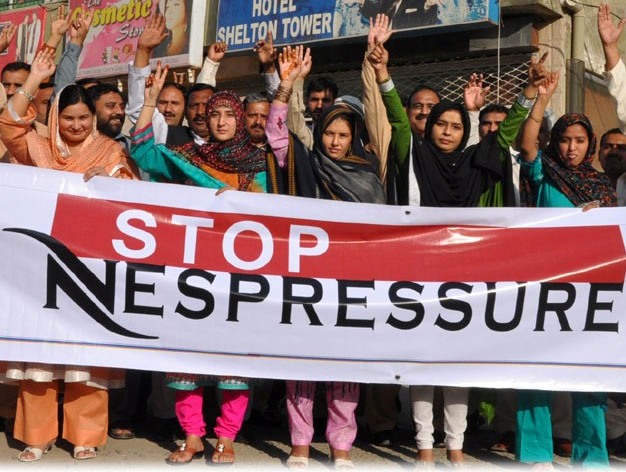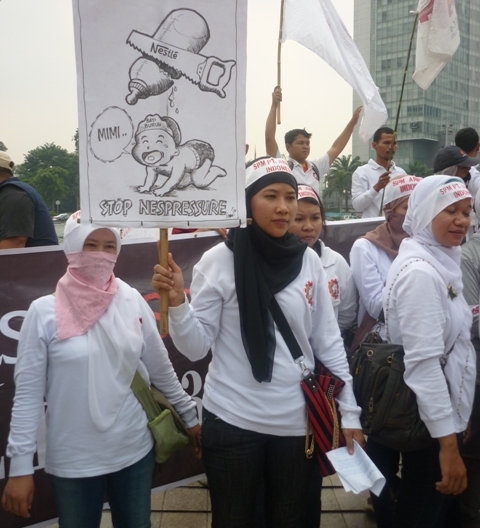Women's rights are far from won



WAGE SLAVES AND PARTNERS OF SLAVES, but resisting. Nestles workers on strike in Pakistan and (below) wives of sacked Nestles workers marching in Indonesia.
INTERNATIONAL WOMEN'S DAY, MARCH 8 has sometimes seemed in danger of being forgotten, or worse, adopted to use by the very establishment and commercial interests it was designed to fight against (as I'm alerted to see by an ad for women's day programmes on Sky TV!). So it is good to see it being properly commemorated by friends, and by among others, the International Union of Foodworkers (IUF).
Their website says:
"On International Women's Day, women workers at Nestlé are fighting discrimination and unequal treatment. For example,International Women's Day has a stirring history. In 1908, 15,000 women marched through New York City demanding shorter hours, better pay and voting rights. The following year there was a declaration by the Socialist Party of America, and the first National Woman's Day (NWD) was observed across the United States on 28 February.
- sisters are fighting Nestlé's attempts to prevent them from taking up leadership roles in their trade unions through promises of training courses to improve skills - in cooking and homemaking;
- sisters are taking up legal battles against double discrimination - as women and as trade unionists at Nestlé.
Click here to send a message to Nestlé management!
Good Food, Good Life? Close the Pay Gap at Nestlé!
Nestlé pays lip service to equality of treatment, pay equity and what the company calls "gender balance". What has this meant for women workers at Nestlé? While efforts are being made to recruit women into management positions to ensure "gender balance", many Nestlé employees continue to work in environments which are far from balanced. Women workers at Nestlé continue to face obstacles to promotion and better pay and will more often than not be found in the lower levels of pay grades. Nestlé blames "external forces" for this while denying its own crucial role as the world's biggest food company in ensuring the full realization of equal opportunity, equality of treatment and pay equity for all its workers".
Women workers faced more than a double struggle. Employers saw women as cheap and (they hoped) docile labour, who needn't be offered a living wage, and who could be bullied and abused just like slaves. Men trade unionists often saw women just as competitors who had no right to be in the workplace let alone expect equal opportunity or pay. It did not always occur to them that by clinging to false ideas of superiority rather than fight for the rights of fellow-workers they were really assisting the boss. Some so-called socialists - the most notorious being the Englishman Belfort Bax -were vociferously opposed to women's rights.
It may be added that some upper-class women who claimed rights and positions for themselves were at best indifferent to the plight of their socially "inferior" sisters and were certainly not going to be allies for the working class.
Against all these obstacles the fight was taken up, and in 1910 at a second International Conference of Working Women in Copenhagen, Clara Zetkin (Leader of the 'Women's Office' for the Social Democratic Party in Germany) tabled the idea of an International Women's Day. She proposed that every year in every country there should be a celebration on the same day - a Women's Day - to press for their demands. The conference of over 100 women from 17 countries, representing unions, socialist parties, working women's clubs, and including the first three women elected to the Finnish parliament, greeted Zetkin's suggestion with unanimous approval and thus International Women's Day was the result.
In 1913 following discussions, International Women's Day was transferred to 8 March and this day has remained International Women's Day ever since. In Russia, because the Julian calendar was still in use, women who went on strike and demonstrated for "bread and peace" on the corresponding day in 1917 set off the "February Revolution". The Czar was forced to abdicate, and the provisional Government granted women the right to vote.
The IUF is using today to draw attention to the struggle of Nestle workers in Indonesia and Pakistan. In Khanewal, Pakistan, hundreds of trade unionists rallied on February 9 in support of the fight for permanent employment and trade union rights for 246 long-serving contract workers at Nestlé's Kabirwala milk factory, 100 of whom face criminal charges for having asserted their rights. On February 12, Mehek Butt, chairwoman of the IUF- affiliated National Federation of Food, Beverage and Tobacco Workers, led a mass demonstration by the Women Workers Federation in Multan in support of the Nestlé Kabirwala workers. Local authorities have met with the workers' committee.In Jakarta, Indonesia, on February 15, members of the FSPM (hotel workers' federation) and SPMKB (Ketjap Bango Independent Union, food) marched to the Nestlé Indonesia Head Office, demanding immediate reinstatement of the 53 dismissed members of the SBNIP at Nestlé's Nescafé factory in Panjang, where they were sacked after an agreement was signed with the company ending their strike in October.
Also on February 15, union activists in New York showed their solidarity with the Nestlé workers in Panjang and Kabirwala at Nestlé's upscale Nespresso boutique in Manhattan, New York. They distributed leaflets to the customers and spoke to the Nespresso manager, calling on Nestlé to reinstate the unfairly dismissed union members in Indonesia and to start negotiating the employment situation of the Kabirwala casual workers.
Two days later, on February 17, Australian trade unionists showed their solidarity when members of the IUF-affiliated National Union of Workers working at Nestle's Uncle Toby's factory in Wahgunyah, Victoria, held a protest action outside the factory, calling on Nestle with the same demands now heard around the world.
On February 20, in Panjang, IUF-affiliated independent food unions joined the SBNIP and dismissed workers' family members for a rally at which demonstrators formed a ring around the factory from 9:00 AM until 2:00 PM to deliver a message to the company that the dismissed union members and their families refuse to surrender their rights.
The demonstration continued the following day in Panjang when 300 trade unionists again ringed the factory and rallied until 4:00 PM. At the same time, hundreds of FSPM workers demonstrated in the center of Jakarta and marched to the Nestlé head office, chanting "Stop Nespressure! Reinstate the 53 workers at the Panjang factory! Recognize and respect union rights!"
FSPM President Budi Triyanto told the crowd: "Everyone soon will know that Nestlé, the world's biggest food company, is treating workers badly. Each cup of Nescafé contains violation of workers' rights, union busting, and the destroyed futures of the workers' children."
In Bangladesh, women workers are a major part of the struggle for decent pay and conditions in the garment industry, working in factories that supply well-known retailers in Europe and the United States.
Here in Britain, War on Want, which is supporting the Bangladesh garment workers' trade union in their fight, has also turned a focus on the highly profitable sportswear industry in this London Olympics year. Reports say women working for all Adidas and Nike factories reported sexual harassment and workers for all three companies had to work illegally long hours for less than the minimum wage. Some Adidas workers were paid as little as 9p an hour, with the average worker in all six factories investigated earning just 16p an hour.
Working with the charity War on Want and researchers in Bangladesh, the Observer found that many workers had been beaten, kicked or pushed, and publicly humiliated. In one Adidas supplier factory, one in three had to work more than 80 hours a week. Workers for all three firms said they faced cruel punishments if they tried to stand up for their legal rights. Aside from the beatings, they said they were sworn at, pushed, forced to undress, humiliated by being made to stand on a table, locked in the toilet or refused permission to use the toilets.http://www.waronwant.org/news/press-releases/17475-london-2012s-coe-pressed-over-adidas-sweatshops
Hajera Khanom, 32, a worker in a factory supplying Puma, said: "They have slapped, kicked and pushed me often. Calling us by abusive names is frequently done. This hurt us emotionally and mentally."
Poppy Akter, from the same factory, said: "I have been scolded with very bad language, slapped, pulled by the hair, made to stand on the table and threatened to be fired and sent to jail."
Plainly, around the world women's rights and equality are far from won. Some of the problems which were confronted over a century ago remain. If there is anything to celebrate on International Women's Day 2012 it is not just the gains that have been made, but the willingness to struggle for what's right, that is still alive and being reborn in fresh generations today.
On Nestles and IUF:
http://cms.iuf.org/?q=node/1458
http://www.iuf.org/cgi-bin/campaigns/show_campaign.cgi?c=655
http://cms.iuf.org/?q=node/1446
On Bangladesh and Olympic brands:
http://www.guardian.co.uk/business/2012/mar/03/olympic-brands-abuse-scandal
http://www.waronwant.org/campaigns/love-fashion-hate-sweatshops/extra/extra/inform/17463-race-to-the-bottom
http://www.waronwant.org/news/press-releases/17475-london-2012s-coe-pressed-over-adidas-sweatshops
On Clara Zetkin and International Women's Day:
http://www.internationalwomensday.com/about.asp
http://library.fes.de/si-online/frauen-intro-en.html
Labels: Indonesia, South Asia, trade unions, women

0 Comments:
Post a Comment
<< Home